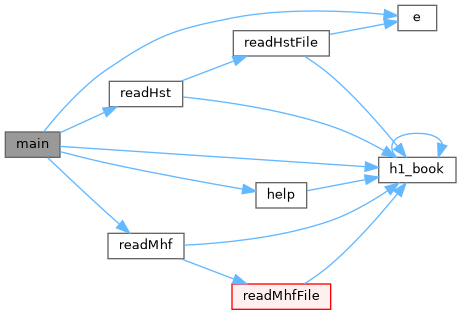#include <stdio.h>#include <stdlib.h>#include <stdint.h>#include <string.h>#include <assert.h>#include <errno.h>#include <string>#include <map>#include <vector>#include <ctime>
Go to the source code of this file.
Classes | |
| struct | HIST_RECORD |
| struct | TAG |
| struct | Tag |
| struct | Event |
Macros | |
| #define | DWORD uint32_t |
| #define | NAME_LENGTH 32 |
Functions | |
| int | readHstFile (FILE *f) |
| int | readHst (const char *name) |
| std::string | readString (FILE *f) |
| std::string | tagValue (const char *tag, const std::string &s) |
| int | readMhfFileV2 (const char *filename, FILE *f) |
| int | readMhfFile (const char *filename, FILE *f) |
| int | readMhf (const char *name) |
| void | help () |
| int | main (int argc, char *argv[]) |
Variables | |
| int | tid_size [] |
| const char * | tid_name [] |
| std::map< int, Event * > | gTags |
| bool | doPrintTags = true |
| bool | doPrintNames = true |
| bool | doPrintData = true |
| bool | doAll = false |
Macro Definition Documentation
◆ DWORD
| #define DWORD uint32_t |
Definition at line 31 of file mhdump.cxx.
◆ NAME_LENGTH
| #define NAME_LENGTH 32 |
length of names, mult.of 8!
Definition at line 33 of file mhdump.cxx.
Function Documentation
◆ help()
| void help | ( | ) |
Definition at line 524 of file mhdump.cxx.

◆ main()
| int main | ( | int | argc, |
| char * | argv[] | ||
| ) |
Definition at line 544 of file mhdump.cxx.

◆ readHst()
| int readHst | ( | const char * | name | ) |
Definition at line 406 of file mhdump.cxx.


◆ readHstFile()
| int readHstFile | ( | FILE * | f | ) |
Definition at line 128 of file mhdump.cxx.


◆ readMhf()
| int readMhf | ( | const char * | name | ) |
Definition at line 511 of file mhdump.cxx.


◆ readMhfFile()
| int readMhfFile | ( | const char * | filename, |
| FILE * | f | ||
| ) |
Definition at line 500 of file mhdump.cxx.


◆ readMhfFileV2()
| int readMhfFileV2 | ( | const char * | filename, |
| FILE * | f | ||
| ) |
Definition at line 449 of file mhdump.cxx.


◆ readString()
| std::string readString | ( | FILE * | f | ) |
Definition at line 420 of file mhdump.cxx.

◆ tagValue()
| std::string tagValue | ( | const char * | tag, |
| const std::string & | s | ||
| ) |
Definition at line 437 of file mhdump.cxx.

Variable Documentation
◆ doAll
| bool doAll = false |
Definition at line 126 of file mhdump.cxx.
◆ doPrintData
| bool doPrintData = true |
Definition at line 125 of file mhdump.cxx.
◆ doPrintNames
| bool doPrintNames = true |
Definition at line 124 of file mhdump.cxx.
◆ doPrintTags
| bool doPrintTags = true |
Definition at line 123 of file mhdump.cxx.
◆ gTags
| std::map<int,Event*> gTags |
Definition at line 121 of file mhdump.cxx.
◆ tid_name
| const char* tid_name[] |
Definition at line 78 of file mhdump.cxx.
◆ tid_size
| int tid_size[] |
Definition at line 55 of file mhdump.cxx.